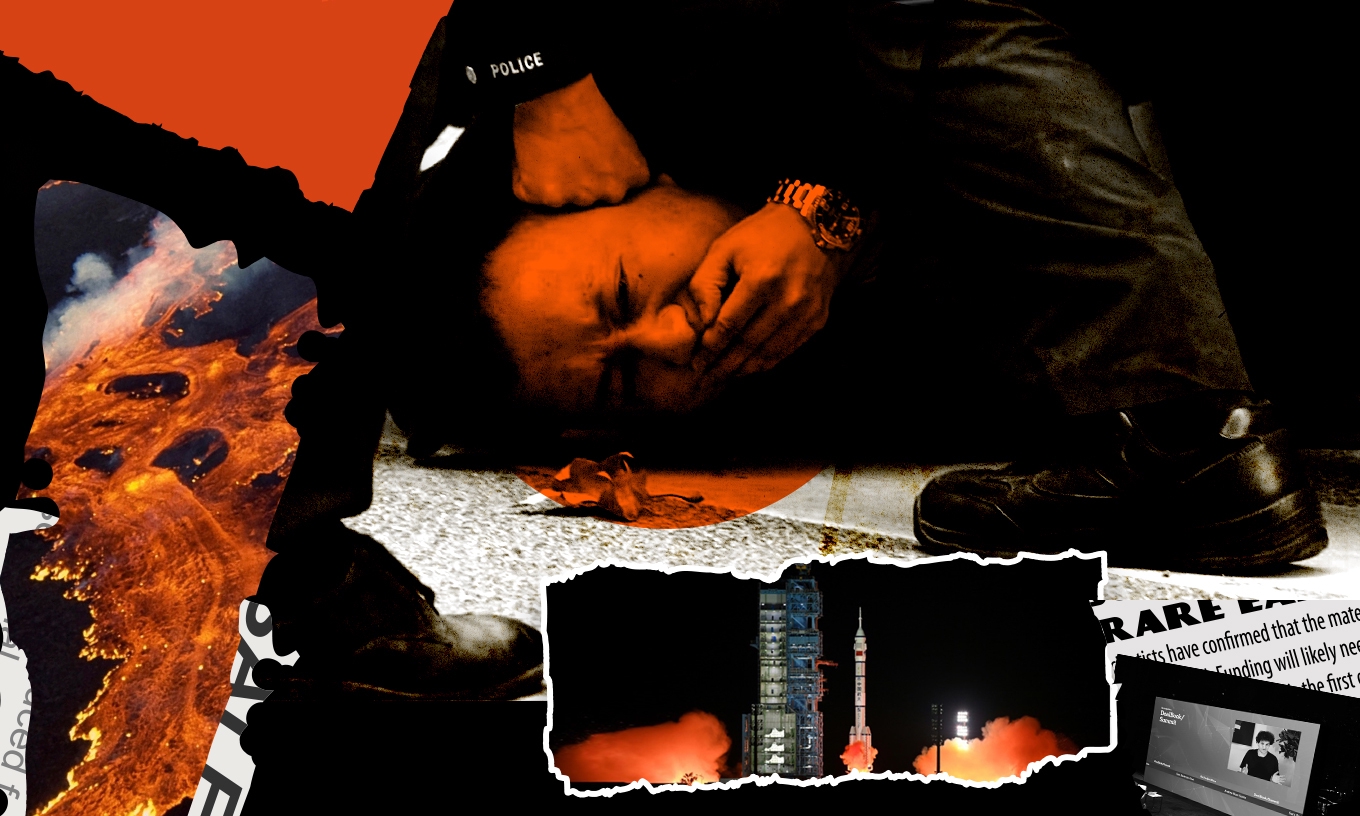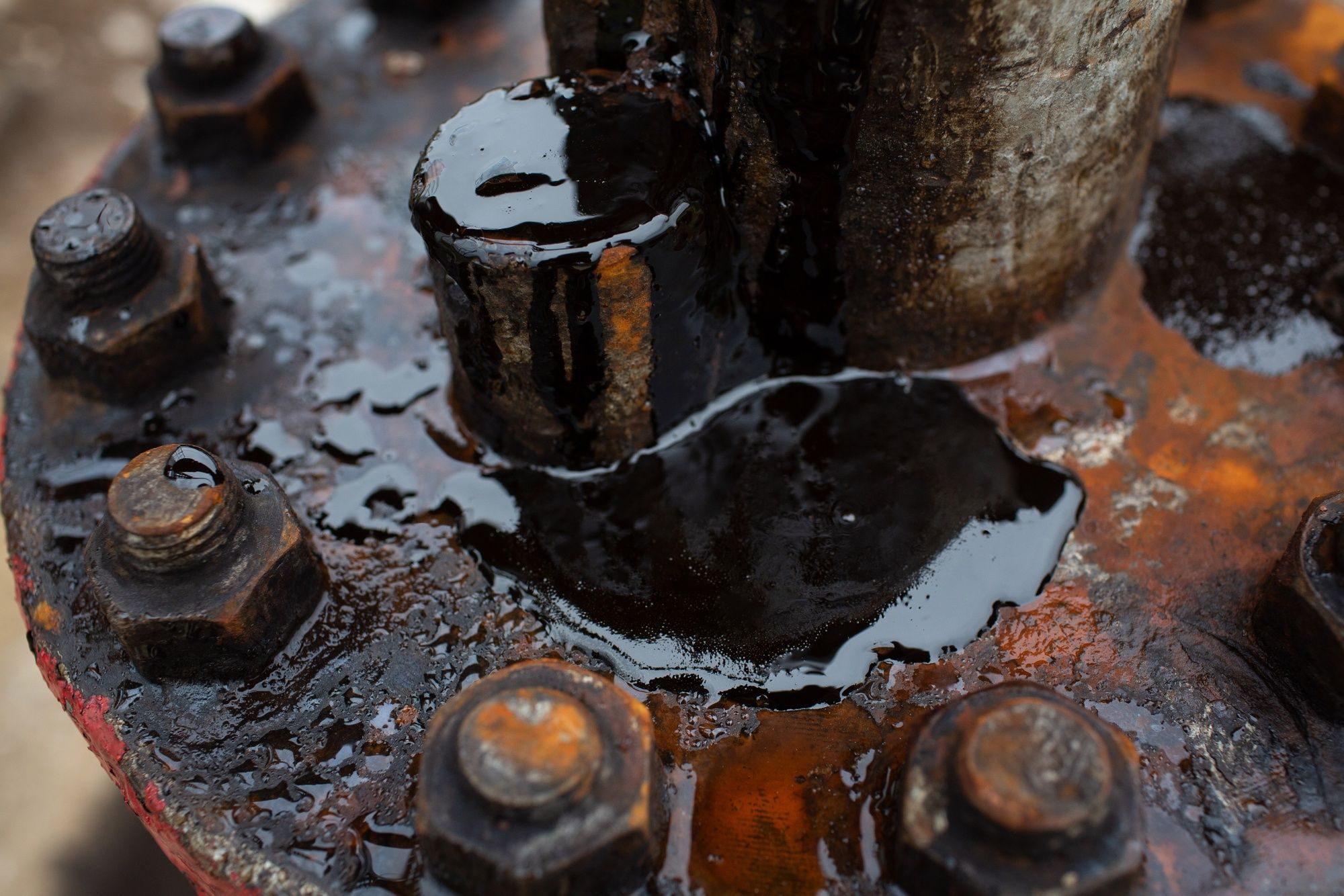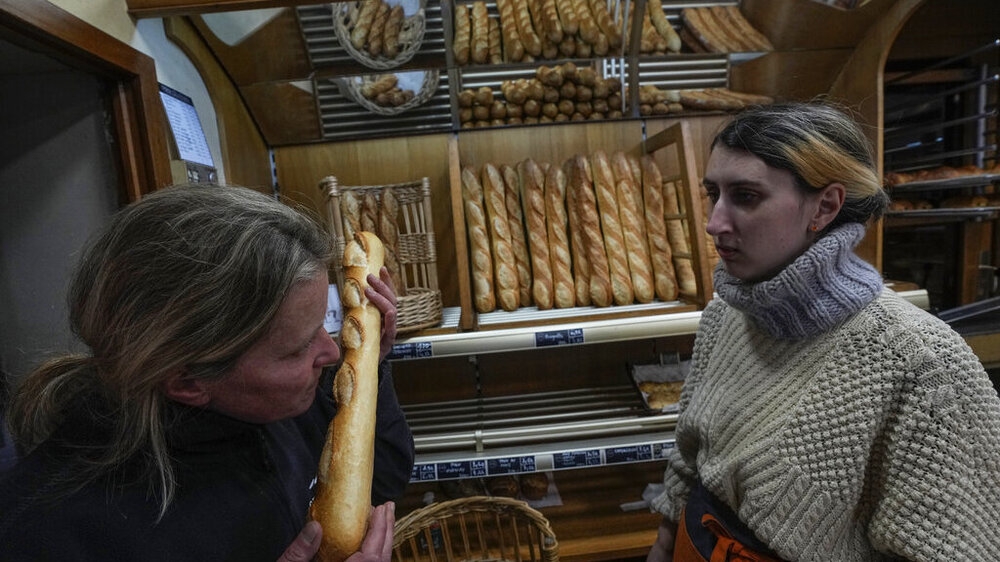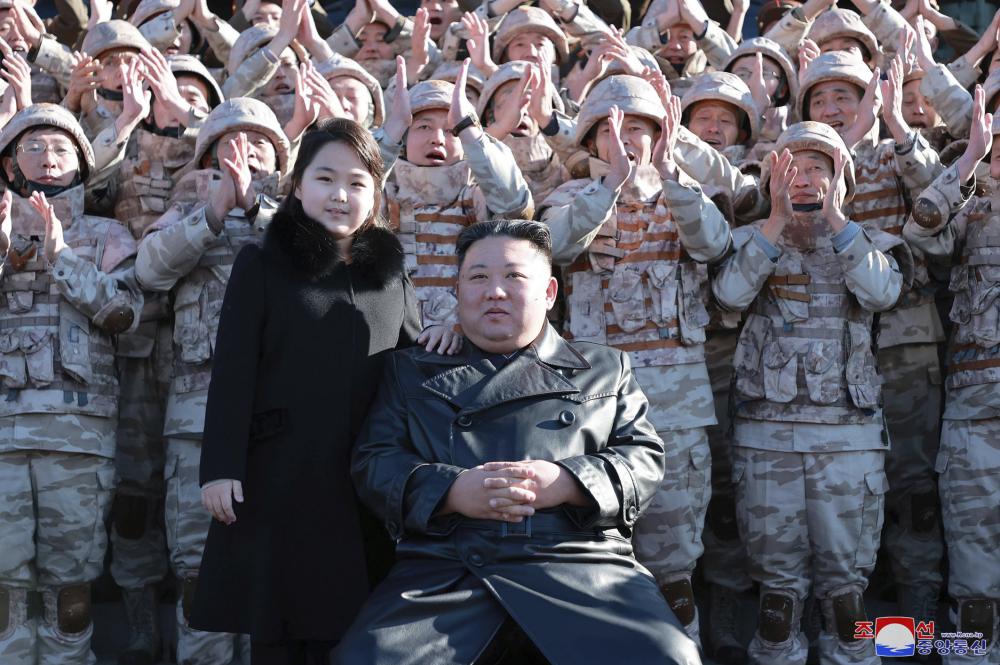The Question
What does that button do?
Talking Points

- Protests were muzzled in multiple Chinese cities
- Beijing moved to unwind strict Covid regulations
- That took the shine off China's space station launch
- Mauna Loa, the world's largest active volcano, erupted
- The US Congress muscled in to prevent a rail strike
- Surprise, British royal family is still surrounded by racism
- Prosecutors proposed a 15-year sentence for Sunny Balwani
- Another fraud, Sam Bankman-Fried, went on an apology tour
- Leon Black can't shake off his Epstein ties, rape allegation
- Eisai's Alzheimer's drug results prompted fierce debate
Deep Dive

What a spectacular finish to the Group Stage of the World Cup. It's a wonderful game. We'll give the FIFA-bashing a rest for the week; they seem to be doing a good enough job of it themselves at the moment.
The group stages of grief
The word fairness crops up a lot when we talk about sport. It helps us place sport in an abstract box of rules and conditions in which true competition can be resolved peaceably. But fairness isn't a solid state, it is an orientation. Applying rules can be messy. Take the Rain Man-esque whiteboard of FIFA ranking computations. A win isn't a win isn't a win. A delicate series of sub-formulae affect each nation's standing. It's all dependent on the quality of the opponent (itself a contestable notion), an importance co-efficient (friendlies ≠ World Cup matches), whether games went to penalties, and all sorts of other qualifiers. What doesn't affect said standing is whether a game was good, or difficult, or fair. (Perhaps this is why the top-ranked team never wins the World Cup.)
Before this World Cup, the 32 teams were ordered by ranking. Brazil sat at the top of the totem pole. Ghana was at the bottom. The top eight were divided among the eight lettered groups. As were 9-16, and so on, and so on. This Group Stage fiddling is just another form of seeding, protecting the best teams from one another to contrive spectacular finals. Fairness here is reserved for the better half at the expense of the worse one. Seeding is a necessary part of any sport competition, but the necessity arises from watchability. So fairness, as we have seen, is contingent on all kinds of other principles in sport. And every now and then, not even once every four years if we're honest, the selective fairness of the Group Stage turns into pandemonium.
E for Expectations Exceeded
It's a funny old thing, the Group Stage. The Germans would have scoured the listings and reassured themselves: well, we're not the worst in there. Spain is the really good team, we're good , Japan is okay , and Costa Rica is making up the numbers . But safety in numbers is illusive. For Germany it was even elusive. Things began poorly when Die Mannschaft led 1-0 at half-time against the Samurai Burū. The Japanese snuck in two unanswered goals in the second half. A surprise for a team stacked with names like Müller, Sané, Gnabry, and Neuer . Spain then beat Costa Rica by what felt like 40 goals in their opener. At the next pairing, Japan fell to Costa Rica (sure) and the Europeans drew with one another (hmm).
This Thursday, it all fell apart. A snapshot in time: early in the second half, Costa Rica led Germany. What? The latter wouldn't be getting out of the Group Stage if the match ended there, but eventually the Germans did pile the goals on. Even so, they needed a second result — the Spaniards to beat Japan. Given Spain's form, that should have been a simple task. But history repeated. When play resumed in the second half, Japan was down one-zip. A mere six minutes later, through an absolute bullet from Ritsu Doan and a very interesting tap-in from Ao Tanaka, they were ahead 2-1. And they would lead to the finish. Does it matter that the ball was possibly out-of-bounds immediately prior to Tanaka's goal? There's that fairness thing again. Auf wiedersehen, Germany. Having turned the best teams in the world inside out in 2014, Die Mannschaft have tumbled out at the Group Stage in consecutive World Cups.
Divided loyalties
This newsletter will arrive just as Groups H and G hand in their final assignments before the Round of 16. Brazil and Portugal are through. Naturally. Switzerland and Ghana strong maybes. Earlier draws mean that two of Cameroon, Serbia, South Korea, and Uruguay could still sneak through. There's still time for plenty of surprises.
Here's a handy list of who you should support in the Round of 16:
🇳🇱 Netherlands v 🇺🇸 USA
(New York's first name was New Amsterdam)
🇦🇷 Argentina v 🇦🇺 Australia
(Messi is over the hill, give someone else a go)
🇫🇷 France v 🇵🇱 Poland
(Mbappé is just mesmerising)
🏴 England v 🇸🇳 Senegal
(Obvious reasons)
🇯🇵 Japan v 🇭🇷 Croatia
(Knocking out Germany was hilarious)
🇲🇦 Morocco v 🇪🇸 Spain
(It's the Re-Reconquista)
Worldlywise

Pricing liquid gold
Two months ago, Russian tankers offloaded around 820,000 barrels of crude oil each and every day at European ports. Last week, just 100,000. On Monday, the European Union will close its port terminals to the world's second largest crude oil producer. The long-awaited ban on seaborne Russian oil has been one of the most divisive responses from Brussels. The stuff flowing through pipelines into Europe is not covered in this action. Since the first round of sanctions landed early in the year, Russia has simply ramped up sales to China, India, and to a lesser extent, Turkey. The volumes have barely budged, but Russia is selling at a steep discount. That discount may be deeper and dearer when the EU's price cap on Russian oil comes into play.
Despite pumping more than 10% of the global supply, Russia is now being dictated to. The EU has very little direct leverage over India and even less (read: none) over China. What the Europeans do have is a handful of the largest marine insurers in the world . If the final details are hammered out, the European Union will require those insurers to refuse service to tankers transporting Russian crude to other countries - unless it is bought at a maximum of $60 a barrel . That's nearly a 30% discount on what Brent crude is trading at today. The final number is still a sore point. The Russia hawks in Estonia and Poland are pushing for a far lower cap. They fear that $60 a barrel will not do enough to damage Russian coffers as Ural's crude is already trading thereabouts.
And the thing is, they are right. It won't do significant damage because the price is calculated at a point that is still profitable enough for Moscow without provoking a drastic cut in exports . While many in Europe and the US align on punishing Russia, other powerful players in the global energy market are more muted. The Saudis continue to chart their own path (against the wishes of the Biden administration) and cut production when they so desire. Producers like Iran and Venezuela are trying to accelerate production. But the thing about oil is that it's too valuable to be held up by politics. It always has been. It will continue flowing, one way or another.

Farmgate
Someone who we haven't visited nearly enough in the last few months is South African President Cyril Ramaphosa. You'll remember what a breath of fresh air he was when ascending to the top of the African National Congress and the presidency in 2018. He campaigned hard on anti-corruption — a wise choice given his predecessor, Jacob Zuma, presided over a system of rampant corruption tantamount to state capture by the fabulously wealthy Gupta family. It took a while — five no-confidence votes before the tenacious Zuma suffered a collapse in support — but Ramaphosa eventually got his man. Sadly, anyone with a passing knowledge of South African politics already knows where this is going.
Ramaphosa's background was in organising. Both labour and livestock. During his years in the political wilderness he built up a sizeable holding in cattle stations and ranches. One of them is the game ranch Phala Phala . It turns over a bit, but not multiples of millions of dollars. Which is why eyebrows were raised at the departments of justices and taxation when it was alleged that thieves had made off with $4,000,000 from Phala Phala in 2020. Stranger still was the fact that the theft was not reported. Even more curious, the source of the information was none other than the former spy chief Arthur Fraser .
Things have gotten very sticky since that allegation was made in June. An independent panel released a report this week into what has been dubbed the "farmgate" scandal. It is contended that Ramaphosa may have engaged in gross misconduct and contravened his presidential oath. That's enough for an impeachment. Those among the ANC (plenty of Zuma loyalists) would be very pleased to see the anti-corruption campaigner felled by a scandal, but a two-thirds majority in parliament is required to impeach the president. The question for the ANC is devilish: kill off their best candidate before the 2024 election, or let him get away with alleged gross misconduct.
The Worst Of Times

San Francisco votes for killer robots
Officials in the famously laid-back city have voted to allow the San Francisco Police Department to use lethal, remote-controlled robots . The SFPD have reassured the public that they aren't going to tape an AR-15 to a Boston Dynamics dog. They haven't ruled out a grenade though. The 60s have never felt so far away in the Bay Area.
Kanye West says some stuff
The world's most terminally-divorced man has been reading about history .
The Best Of Times

The world in a breadstick
For all the fuss about Le Cordon Bleu and Parisian haute cuisine, the simple baguette is the French culinary tradition that will be preserved for humanity's benefit. One baker, when informed of UNESCO's decision, responded with the typical measure of French modesty, "Of course, it should be on the list because the baguette symbolises the world, it's universal."
Put that back
A London museum has become the latest to hand over its entire set of 72 Benin bronzes to Nigeria's National Commission for Museums and Monuments. A fine and decent decision, if an overdue one. Now that the conversation about cultural repatriation is well underway, we should check in on the crooks at the British Museum, London. Their steadfast refusal to return the Elgin marbles prompts us to ask whether they've lost theirs.
Highlights
The Image

Some of you have asked for the Weekly Wrap to feature photos of people that aren't Kim Jong-un. To those people we say simply this: no. Here North Korea's Supreme Leader (finely attired as always — is that Hugo Boss?) joined by a new daughter he has magicked out of thin air. Yes, reviewing inter-continental ballistic missiles counts as quality father-daughter time. Photo supplied by The Guardian .
The Quote
"To be clear, he's not actually using a keyboard. He's moving the cursor with his mind to the highlighted key. Now technically, he can't actually spell. So I don't wanna oversell this thing, because that's the next version."
– Neuralink presented its menagerie of chipped animals this week. During the "telepathic typing" show, Elon Musk let the audience in on a trade secret: monkeys don't actually speak English. Say what you will about the man — he keeps himself busy! All those sleepless nights on the Tesla factory floor have burnished his image as the prototypical hands-on CEO. We can only assume he is personally drilling simian skulls but we'd rather not think about it.
The Numbers
0 parts per million of CO2
- Great job, everyone. We did it. This week the US National Oceanic and Atmospheric Administration's Mauna Loa Observatory reported that the amount of carbon in the atmosphere went from 414.72ppm to... 0. Now why is that name Mauna Loa familiar? Ah, well. Never mind .
3 1/2 minutes
- A Florida woman (isn't that progress!) has launched a $5m class action lawsuit against food manufacturing giant Kraft. Cheese too yellow? Too much sweet chilli in that Philly? No. The litigant contends that the phrase "ready in 3 1/2 minutes" is misleading. We're eagerly awaiting the moment a microwave is wheeled into the courtroom...
The Headline
"French man wins compensation as judge awards him the right to refuse to be fun at work" — Fortune . A Spartacus for our times.
"Scientists revive 48,500-year-old 'zombie virus' buried in ice"
— LiveMint . Just no. Don't do it. Leave it alone you weirdos.
The Special Mention
At risk of drawing the ire of the inkl Special Mention Ethics Committee, we're awarding the coveted prize to the good people of Australia . This week, they voted for the Macquarie Dictionary's people's choice word of the year: bachelor's handbag (noun) . For our many thousands of readers from countries that are not Australia, this noun refers to a supermarket-bought whole roast chicken transported in a plastic bag with handles.
The Best Long Reads
- Foreign Affairs explores Xi Jinping through his own words
- Financial Times on an international lending war in Asia
- The Atlantic welcomes the demise of humankind
The Answer...
It deletes your entire inbox . Press it.







